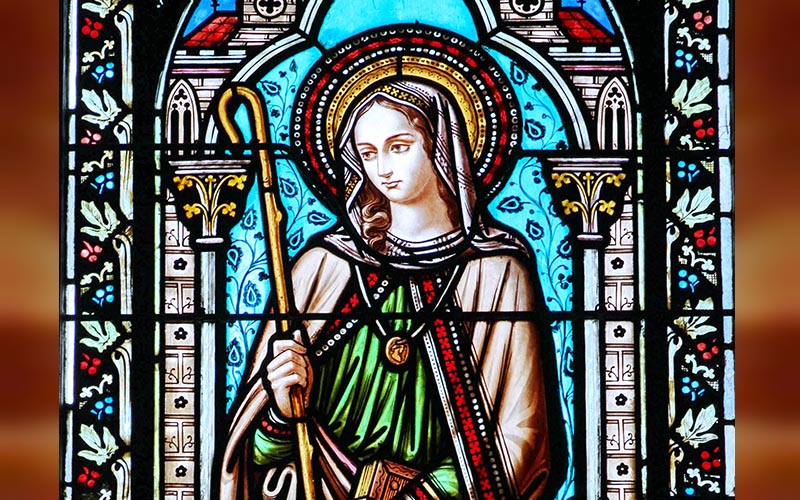When the Roman Empire was collapsing and the barbarian invasions were shaking the world, God raised up a fearless and confident virgin who defeated Attila with the weapons of faith and, at the same time, cradled in her arms the civilization that was being born under the sign of the Cross.
It was the year 423, a troubled time, sown with wars and invasions, when a dying civilization was emitting its last gasps.1 The Roman Empire, once almost indestructible, threatened to collapse under the furore of the barbarian invasions. Between treaties and military manoeuvres, it had achieved another period of peace; it was, however, no longer the same life that flowed in its veins. The invading peoples had settled in its territory and, although apparently pacified, they posed a constant threat.
In Gaul, also for the moment peaceful, a girl was born. Like so many providential vocations, she was the child of expectation, of prayer and of promise. Gerontia and Severus had been married for some years and were asking Heaven for the gift of becoming parents. The child’s name, to some, means Janua Nova or New Gate; to others, based on Celtic roots, Geno Eff, Mouth of Heaven. But although the etymology of her name is not known for certain, historical reality proved Genevieve to be, in fact, a “new gate” through which an era began and, because of her sanctity, the “mouth” by which Heaven spoke.
Chosen by God at a tender age
When Severus was a young man, he held a high post in the Roman army in Gallic lands, although he was of Germanic origin. Gerontia was the daughter of the commander, also a barbarian, under whose orders Severus fought. Both husband and wife were profoundly Catholic, untainted by Arianism – a heresy that was still rampant at that time –, and faith was an important factor in their union. Having retired to look after his property in Nanterre, near Lutetia, now Paris, Severus was given the influential post of administrator of the empire in that region.
It was there that Genevieve came into the world. Her childhood was spent in the serenity and innocence of country life. One day, when she was about seven years old, a great commotion spread through the village in the wake of an unexpected event. Two bishops sailing down the Seine in a small fleet had come ashore in that region. St. Germanus of Auxerre and St. Lupus, by mandate of Pope St. Celestine, were on their way to Brittany to fight the Pelagian heretics, who were dragging the faithful into their errors.
A crowd was waiting for them on the banks of the river to receive their blessing and accompany them to the church. What blessed times those were, when a holy Pontiff entrusted two saintly prelates with the task of defending true doctrine, and they, aware that they could do nothing without the grace of God, planned their stops not only to recover their strength but above all to implore the Most High for light and courage for the accomplishment of their mission!
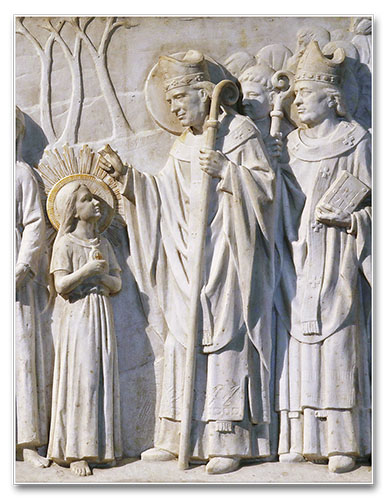
Severus and Gerontia, the civil authorities of that place, were their hosts; also little Genevieve, enthusiastically in the midst of the people, accompanied the holy bishops. Before they reached the church, St. Germanus rested his eyes on the little girl and, halting the procession, asked the people:
“What is the name of this young girl?”
“Genevieve,” several answered; “she is the daughter of Severus and Gerontia,” others added. What St. Germanus contemplated supernaturally, no one knew. But it is certain that the Holy Spirit revealed to him that the Lord’s designs rested upon the girl in a special way, and reserved a great future for her.
“Is she your daughter?” he asked the couple. “Blessed are you who have given birth to such venerable offspring! The Angels of Heaven celebrated her birth with joy and exultation. She shall be great before the Lord.”
The little girl came forward, and the bishop placed his hand on her head.
“Genevieve, my daughter, do you wish to consecrate your virginity to God, and give your heart to Him alone?”
“Yes, my father!”
And, in a prophecy that would sum up Genevieve’s long journey on this earth, St. Germanus continued:
“The Lord will give power and strength to your resolve.”
Early the next day, Severus entered his daughter’s room and awakened her. St. Germanus and his retinue were leaving, and the bishop wished to see her before setting out on his journey. Genevieve rose in haste, and coming before the prelate, promised once more to consecrate her virginity. Her father, as he kissed the episcopal ring of St. Germanus, expressed his sorrowful consent to entrust to God his little girl, more precious to him than any treasure.
Maternal incomprehension and divine chastisement
At home, a tempest awaited them… Gerontia, who had not accompanied her husband to the farewell and did not even know that Genevieve had left, did not look kindly on their arrival. In an irate tone, she asked her daughter:
“Where have you been?”
“I was with the holy bishops, Mama.”
“And with whose permission?”
Severus explained, as he was leaving to fulfil his duties: “Germanus wanted to see our daughter before leaving, to confirm the promise she made yesterday.”
Then, lightning and thunder fell upon the little girl.
“Look at me! What did you plot with your father? What did the two bishops tell you? I want to know. Answer me at once!”
Genevieve, who had never seen her mother in such a fit of anger, tried to explain, but Gerontia refused to understand and burst into tears. Appealing to Genevieve’s tender feelings, she affectionately clasped her in her arms. She, who had waited so long to become a mother, did not want to lose her daughter. Gently, the girl disengaged herself and headed towards the door, for the church bells were calling for the Office. Her mother then, forgetting the affection she had just shown, tried with greater fury to stop her, but behold, she fell down as if annihilated: she was blind.
Despite her young age, the girl would fight to keep her word and, despite successive attacks and insults from her mother, she stood firm. According to her oldest biography, Genevieve’s parents understood that God had punished Gerontia for having become unworthy to be called Christian by opposing their daughter’s vocation.
Dawn of a life of miracles
A year had passed since that terrible day. The unfortunate woman had been examined by doctors, but they could not explain Gerontia’s blindness, for her eyes were healthy. One morning she asked her daughter to draw water from a well which, since time immemorial, had on occasion had a curative effect. Kneeling, mother and daughter asked Heaven for a miracle. Genevieve traced the sign of the Cross on the water and bade her mother to wash with it. Opening her eyes, Gerontia saw the darkness dissipate and the figure of her daughter, grown and strong, appear before her. From then on, she never again opposed her vocation.
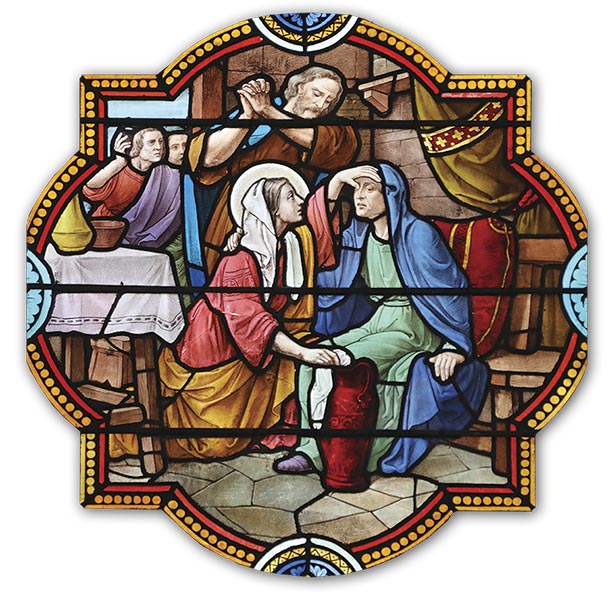
This was the first miracle that God worked by the hands of Genevieve, at the outset of a life full of supernatural feats, miracles, healings and exorcisms that would continue until her death.
Several years later, as an adolescent, she formally consecrated herself to God, together with a group of other virgins from Nanterre. She went to live in a cave located near her parents’ home, and visited them regularly until they both died when she was about seventeen years old.
Humiliations and trials: the city of Lutetia rejects her
With the painful loss of her parents, a new phase opened up for Genevieve, in which her mission would truly begin. Because of her young age, she was obliged to leave her hometown and move to Lutetia, where her paternal aunt, also her baptismal godmother, welcomed her.
The virtue that distinguished her soon cast its rays on those who would thenceforth be her fellow townsfolk. She visited the sick, cared for the afflicted, and generously distributed her wealth to the needy. She had a kind word for all and a welcoming smile, which revealed the holiness that inundated her soul.
But envy began to gnaw at the hearts of many. As a rule, the highest virtues are difficult to imitate; in some people they elicit admiration, but in many others the desire to destroy. Thus, some malicious tongues began to raise the most infamous suspicions about the virgin of Nanterre.
The accusations multiplied: being of barbarian origin – and not Gallo-Roman – she was undoubtedly a spy for the invaders, who would deliver the city into the hands of the enemy; her liberality in giving alms proved her evil intention, since in this way she bought the sympathy of the most humble; moreover, her hypocrisy reached the point of wearing the veil of the virgins unworthily, for she was leading a shameful life. And, as usually happens in such cases, there was no lack of supposed witnesses to such sins…
When she went out into the street, she became a target for insults and sometimes even stones. On the wall of her house they wrote: “Vade retro Genovefa.” Clearly, Lutetia no longer wanted her and was going to expel her.
St. Germanus defends her integrity
However, a small fleet crossed the Seine and landed at Lutetia. Once again St. Germanus, now advanced in years, was on his way to Brittany to fight the Pelagians, who had reappeared. The people received him and informed him of the horrors they were attributing to Severus’ daughter. In his soul, St. Germanus shuddered. Had that angelic little girl indeed lost her innocence? He had not seen her for more than fifteen years and did not even know that she dwelt in that city.
Deeply moved, he told the crowd how he had met her and mystically seen the design that hovered over the girl, and how she had consecrated herself since childhood. He then proceeded to the church where Genevieve was praying. He found her kneeling and, on seeing her, the discernment with which he read hearts revealed to him that she was upright and pure.
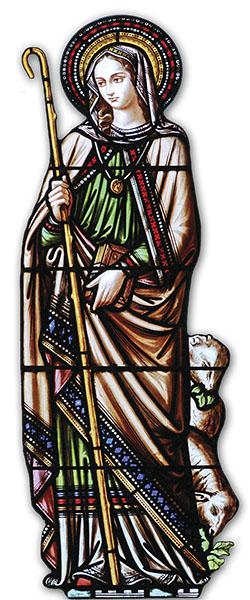
From that day on, the furore was calmed in Lutetia. However, an even greater storm was brewing.
St. Genevieve delivers Paris from the Hun invasion
Gaul was oppressed on all sides by the threat of invading peoples. This was nothing new, but this time the most fearsome enemy was approaching: Attila, king of the Huns. On Holy Saturday 451 he had seized Metz, and was already near Soissons, a hundred kilometres from Lutetia. Every day, dozens of refugees arrived in terror, fleeing from the conquered regions. The terror of the Parisians was growing to the point that they themselves began to gather their belongings and prepare to escape the city.
The only one who remained confident was Genevieve.
She turned to her fellow citizens, who were beside themselves with fear, and began to act. She tried first to persuade the ladies about the importance of praying and imploring God’s help, without giving in to despair. She invited them to prayer, inspired serenity in them and asked them to persuade their husbands. But when the latter saw their wives completely influenced by the servant of God, they rose up against her once again and decided to put an end to her life.
“Attila will not attack us; he will not come near Paris,” Genevieve insisted. No one knows from where she drew such certainty; the fact is that her sanctity helped her to abandon herself fearlessly to Divine Providence. During the battle which was being fought close by, she prayed inside the church. The people, vacillating between confidence and despair, piled up at its doors the stones with which, should Attila win, they would kill Genevieve in revenge.
After a difficult period of uncertainty, the watchman, posted on the mountain top, lit the fire: it was the sign that they were saved! The people ran to the church where Genevieve was kneeling, and carried her in triumph through the city. Their most effective shield was the faith of that virgin!
Centuries later, the Church would still praise with admiration she who had saved Religion and the State in Paris: “When formidable hordes of Huns were besieging Paris, the holy virgin Genevieve, who was given to a life of continuous prayer and austere penance, cared for the souls and bodies of her fellow citizens with wondrous charity.”2
Her role in the birth of Catholic France
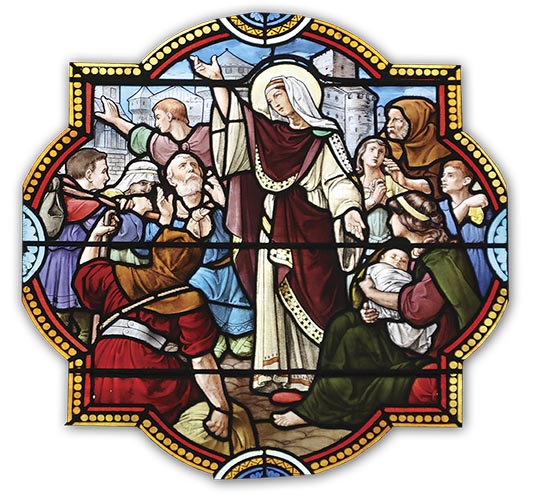
Decades passed since that memorable day. Genevieve had crossed the threshold of seventy years of age; her eyes, however, still reflected the same fortitude of soul. She had become the mother and protector of that people; she had watched the gradual and definitive fall of the Roman Empire, and had maintained wise diplomacy with the Franks. Clovis, who ascended the throne after Childeric, was gradually extending his kingdom and thought that, like his father, he would be able to maintain good relations with Genevieve. She, however, decided to close the doors of Lutetia to the pagan sovereign. Just as she had once protected the city from devastation, she now safeguarded its faith. And Paris, through St. Genevieve, held out for ten long years.
Clovis, losing patience, laid siege to the city. All that remained was death or dishonourable surrender. Then, on a moonless night, the venerable old woman ordered some boats to make the arduous journey up the Seine for supplies from the neighbouring city, unobserved by the enemy. On their return, when the winds threatened to capsize the vessel, an order from her restored calm to the waters. Once in the city, she wisely administrated the supplies, repeating the enterprise in such a way as to make it possible to survive the siege for a whole year.
The Frankish king, interested in other territories, finally diverted his army to other battles and left Paris free. Some time later, in 496, Clovis ruled over almost all of old Gaul: only ancient Lutetia remained. He sent emissaries to Genevieve, who replied: “Convert to Christianity, and Paris will open its doors to you.”
Exasperated, Clovis turned away, and proceeded to make war against the Alemanni. At a moment of extreme difficulty in battle, he prayed to the “God of Clotilde”, his wife – who was none other than the “God of Genevieve” – vowing to be baptized if he succeeded. Miraculously, victory shifted in his favour. On his return from the battle, he found the gates of Lutetia open and the city adorned: the people welcomed him with cheers and Genevieve finally delivered it to the converted king.
Thus, in the arms of this venerable old woman a new civilization arose, marked by the sign of the Cross and washed by the waters of Baptism, upon which she bestowed, as the most precious treasure, the burning flame of her own faith. Catholic France was born out of her abandonment to and confidence in God, out of her intransigence and fidelity to the Church: this would be the sure path that would lead future Catholic nations to happiness and peace. ◊
Notes
1 The historical and biographical information in this article is based on: VIE DE SAINTE GENEVIÈVE: SC 610; SCHMIDT, Joël. Sainte Geneviève: la fin de la Gaule romaine. Paris: Perrin, 2012.
2 PIUS XII. Evangelii præcones, n.34.


